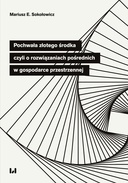Explore

Pochwała złotego środka, czyli o rozwiązaniach pośrednich w gospodarce przestrzennej
Mariusz Sokołowicz
2024
0 Ungluers have
Faved this Work
Login to Fave
Today, the benefits of intermediate solutions in societies and economies need to be sufficiently appreciated. When we are demanded to be the best, or every city or region has the ambition to be the biggest, the risk of overstepping the already heavily compromised growth boundaries and frustration finding vent in political tensions increases. The answer may lie in a return to a culture of the 'golden mean' and intermediate solutions (between excellence and mediocrity, wealth and poverty, centralisation and dispersion, power and freedom) as an antidote to the extremes leading to tensions and crises. Based on communities working for the commons and discussing a shared future, local governments can be a laboratory for these changes. The 'golden mean' of the title has a profound ontological, ethical, axiological and pragmatic justification. It applies to the social sciences, of which spatial management is one. The author of the monograph argues that ordinary people in their mass are the key to modern development, including the further development of local self-government. However, this requires building in society and politics a culture of acceptance of diversity as an immanent feature of the human species. To be effective, actions must be accepted by ordinary people. To be taken, they must come from them and not be imposed. They must stem from a sense of agency, even at the level of the most minor, bottom-up collective action to go from them. To foster such a sense, territorial-administrative systems should be decentralised de facto rather than de jure, and the territorial diversity of institutional arrangements, understood as multiple routes to the same goal, should be considered natural.
This book is included in DOAB.
Why read this book? Have your say.
You must be logged in to comment.
